Lower ticket prices for scenic sites will boost tourism

Scenery of Xishuangbanna
In the Government Work Report, delivered to the National People's Congress, China's top legislature, in Beijing on March 5, Premier Li Keqiang vowed to lower ticket prices at key State tourist sites. Cjn.cn comments:
Being written into the Government Work Report means the ticket prices for key tourist sites will be reduced soon.
For instance, Xishuangbanna scenic site in Southwest China's Yunnan province, a famous tourist destination, has announced it will be free for locals, which is the first of its kind in China and sets a good example for others to follow.
With people's income constantly rising in the past decade, it has become the habit for a growing number of families to travel during the holidays. However, many scenic sites have also been raising their ticket prices so abruptly that many people complain the prices are too high to afford. Even though certain local tourism authorities have issued three-year bans that forbid the scenic sites from raising prices, the latter always raise them as soon as the ban expires.
It should be noted that the majority of tourist sites are places of natural beauty and as such they should serve the public. However, many scenic spots are managed by profit-seeking companies that hope to maximize their interests. Certain local governments even support them in order to get more tax and other revenue. That's the key reason why the prices of tickets for scenic spots remain so high.
That practice in turn hurts the economy of the whole nation. When ticket prices are too high, people's enthusiasm for traveling will be curbed. Worse, when too many domestic scenic spots raise their ticket prices, tourists will go overseas.
The Government Work Report has pointed a right direction for solving that problem. Only by lowering ticket prices and making the nation's scenic sites serve the public interests will the whole tourism industry be boosted. Actually, with lower prices, tourists are expected to spend more on consumption in scenic sites, which in turn will promote the incomes of the scenic sites too.
Editor: John Li